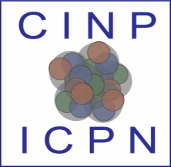Postdoc in neutrino-nucleus interactions available at Fermilab
I have opened a search for a postdoc to join my group at Fermilab. While the research to be pursued is motivated by applications to particle physics, MeV-scale nuclear reaction modeling (e.g., Hauser-Feshbach calculations) and related experimental techniques (e.g., extraction of Gamow-Teller strengths from charge-exchange data) will be highly relevant to the project. I would therefore like to make a special effort to advertise this opportunity to junior scientists in the low-energy nuclear physics community. Candidates with strong C++ programming skills and research experience in topics related to those mentioned above are encouraged to apply.
Please find application instructions here: https://academicjobsonline.org/ajo/jobs/31223. The deadline is December 15.
I have included details about the position below my email signature. Interested candidates are welcome to contact me directly (gardiner@fnal.gov) if you have any questions.
Steven Gardiner (he/him/his)
Deputy Department Head / Associate Scientist
Physics Simulation Department
Data Science, Simulation, and Learning Division
Fermi National Accelerator Laboratory
(630) 840-4076 office
-------------------------------------------------------------------------
Expected job responsibilities will involve a roughly equal mix of C++ software development and data analysis. The software work will focus on making improvements to MARLEY, a Monte Carlo code that simulates O(10 MeV) neutrino-nucleus scattering. In collaboration with a team of nuclear theorists, the successful candidate will refine and quantify uncertainties on MARLEY's model of primary neutrino interactions as well as its Hauser-Feshbach approach to subsequent nuclear de-excitations. Theoretical details for the current public version of MARLEY are available in Phys. Rev. C 103, 044604 (2021).
On the analysis side, the research goal is to make targeted cross-section measurements with current Fermilab neutrino experiments to fill gaps in the data available for MARLEY validation. These will involve both low-energy neutrino interactions well as MeV nuclear activity induced by other processes.
Simulation improvements from these activities will enable a broad science program using the multi-billion-dollar Deep Underground Neutrino Experiment (DUNE) currently under construction in the US. Topics of interest include studies of astrophysical neutrinos and a wide variety of searches for physics beyond the Standard Model. Operation of the first ten-kiloton module of the DUNE far detector is expected to begin in 2029. The successful candidate will be in an excellent position to design and lead near-future low-energy measurements with DUNE.
